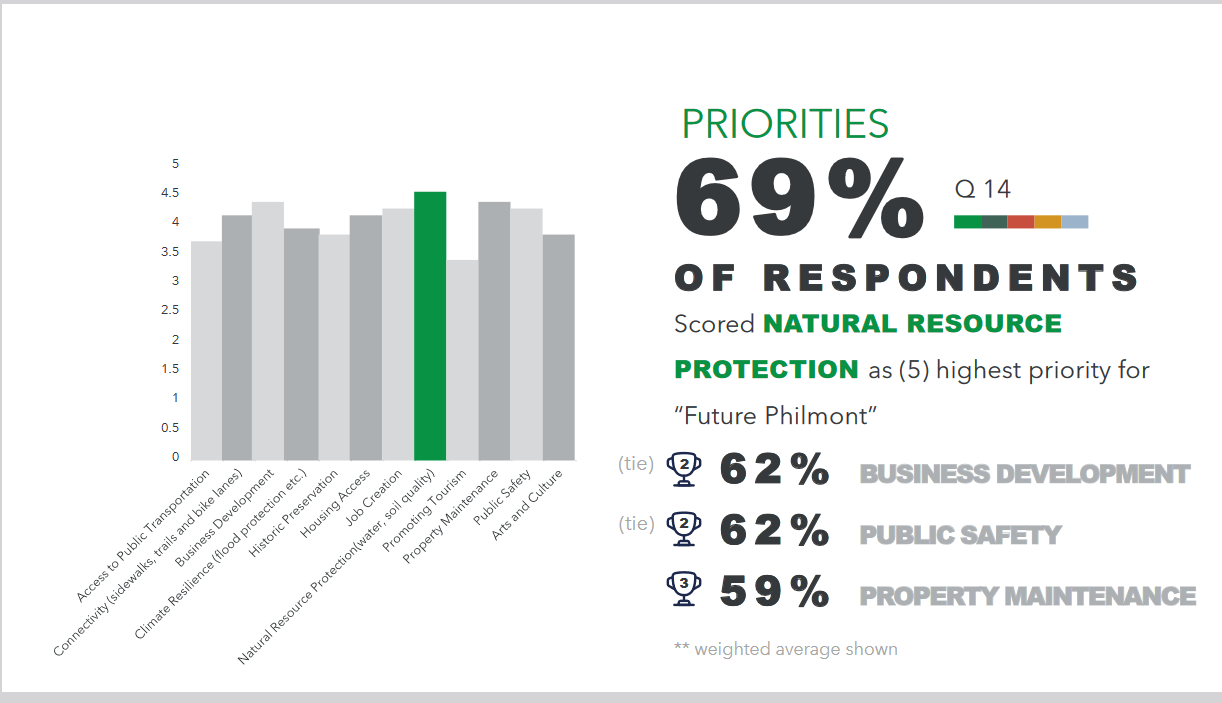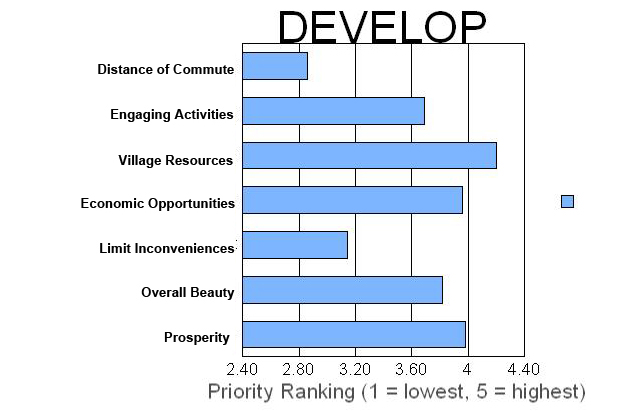Breaking News! - November 2023

Protecting Natural Resources as the number one priority in a recent survey conducted in the village to inform the updates to the 2003 Comprehensive Plan echo the D.E.V.E.L.O.P. project conducted by PBI in 2012.
See the results of the 2023 Comp Plan survey.
D.E.V.E.L.O.P.
A Special Project internship conducted in 2012 by Chris Redwing, a graduate student attending the Nelson A. Rockefeller College of Public Affairs & Policy at SUNY, Albany. The goal of the project was to evaluate community priorities before undertaking the community planning process for an economic development master plan which was published in 2018 as the Summit Lake and Its Watercourse BOA Step II Nomination funded by the NYS Department of State Office of Planning and Development.
What is D.E.V.E.L.O.P., and what are we trying to accomplish?
D.E.V.E.L.O.P. was created as a tool for the community. Most citizens don't have a lot of free time to interact with their local government. But should a citizen's voice only be heard during an election? We don't think so. So how do we keep citizens involved in their community without feeling bogged down?
D.E.V.E.L.O.P. assumes one thing above all else: Citizens have priorities. These priorities do not require hours of research or the understanding of legalese. But they can be used to let local leaders know what the village should be focused on.
Seven of these priorities were identified from the 2003 Village Comprehensive Plan, which are reflected in the acronym D.E.V.E.L.O.P.
During a three month period in 2012, an installation was set up in the Resource Center which asked citizens in Philmont to put down on a small handout chart a value from 1 to 5 (5 being the highest) for each priority identified in D.E.V.E.L.O.P. From the responses, we can start to create a roadmap that local leaders can follow which clarify community priorities Below are the seven priorities.
Distance of commute - Do you feel like you are spending too much time traveling to work or for services that could be local instead?
Engaging activities - Should the Village work to create and support more events and activities?
Village resources - Should resources like the reservoir, High Falls and the Mill District be protected and developed?
Economic opportunities - Should the village do more to encourage economic growth for citizens?
Limit inconveniences - How important is fixing small problems that are annoying now but might turn into larger ones later?
Overall beauty and upkeep - Should the village improve how the village looks to residents and outside visitors?
Prosperity - Do you feel that the village should be focused on a cohesive sense of community, prosperous not only in an economic, but emotional sense?
When citizens are able to express their priorities to their local leaders, the government can be more responsive to them.
How does this fit into an idea of Sustainability?
The strength of Sustainability lies in its practicality and wide-ranging benefits to everyone. Sustainability is a key part of each of the seven priorities, as will be explained here.
Sustainability can help a community's distance of commute by focusing on local providers for food, goods and services. The longer someone is required to travel not only pushes more CO2 into the atmosphere, but also costs time and money for gas which could be better spent on what citizens choose for themselves.
A wide range of benefits can be maintained through sustainable practices. For example, the preservation of Village resources is important for our environment not only for its own sake, but to keep a sustainable ecosystem for hunting, fishing, swimming, camping, hiking and countless other engaging activities.
When dealing with the critical need of economic opportunities, sustainable energy practices can save money for local government, businesses and households. Businesses promoting solar energy and other green jobs including higher efficiency products can also be included in this. In addition, a more localized focus keeps money in the area, helping the community first and foremost instead of outsourcing income and profits.
As we limit inconveniences now, we can keep them from turning into larger problems later. This keeps us from wasting unnecessary resources and dealing with unnecessary costs as long as we maintain and improve on a sustainable standard of living.
When we improve the overall beauty of our surroundings, we can bring the benefits of sustainability into a clear and celebratory presence all around us. Planting trees and creating beautiful gardens reminds us of how our environment creates a better life for us in ways beyond just lofty ideas.
_____________________________________________________________________________________
Methodology:
During a two month period over 150 community residents and business owners participated in the D.E.V.E.L.O.P. survey and project by interacting with our intern, Chris Redwing, a resident of Philmont attending the Nelson A. Rockefeller College of Public Affairs & Policy at SUNY, Albany. The interaction with Chris stimulated many conversations and insights by residents and business owners into their experiences of living and working in Philmont. Chris, aided by several young volunteers, greeted residents at the Resource Center, the Post Office, the Philmont Farmers' Market, and on Philmont's Community Day providing people with three different ways to participate in the D.E.V.E.L.O.P survey and project.
They could provide a "priorities" ranked scoring from 1 to 5 (5 being the highest) to the five color coded survey questions by filling out a simple color coded form, or interact with Chris in a dot survey of the color coded form installed on a sandwich-board to provide a value (1-5) colored coded "dot" ranked scoring to the five questions, or if they chose not to take the survey they could add their observations, ideas, and thoughts about Philmont to the large interactive map at the Resource Center providing valuable "snap shots" of community input hand-written on five differently colored "Post Its" which corresponded to the five color coded D.E.V.E.L.O.P. survey questions.
____________________________________________________________________________________
Early results to D.E.V.E.L.O.P clearly showed the top priority to residents in Philmont is Village Resources.
 data received updated 5/18/12
data received updated 5/18/12
Distance of commute (Encouraging services or overlooked needs locally as well as public transportation) Examples: Encouraging a laundromat or grocery store in Philmont instead of driving to Chatham or Greenport, shuttle bus routes, that sort of thing.
Engaging activities (Encouraging activities for citizens to do on a regular basis.) Examples: Festivals, concerts, recreational opportunities for children, park programs, community center activities for older citizens.
Village resources (developing and protecting environmental and historical locations) Examples: Encouraging the development of our lake(s) for fishing, hiking trails, protecting the Mill District for historical reasons.
Economic opportunity (encouraging new businesses, assisting in job searches and training) Examples: Focusing on bringing in business to Main Street and other areas in the Village for the purpose of jobs and promoting job training opportunities.
Limiting inconveniences (Encouraging the community to focus on maintenance and convenience.) Examples: Trash collection, snow removal, pothole and sidewalk repairs, Village Hall hours.
Overall beauty (Encouraging the community to focus on the overall appearance of the area) Examples: Planting trees, cleaning up or focusing on rehabilitating buildings, etc.
Prosperity Examples: Encouraging pride in Philmont, involving community events centered around citizens in the village, encouraging cooperation and volunteer projects and giving opportunities for citizens to communicate with each other.
____________________________________________________________________________________
As Philmont Beautification, Inc., moves forward to implement the community driven strategic plan focused on finding sustainable answers and planning solutions, the data gathered in D.E.V.E.L.O.P. will directly impact and inform our organization's design of programs and selection of projects. Our organization views the principles of sustainability as an opportunity for communities to work collaboratively to promote smarter growth policies and practices to create more sustainable communities—ones that are environmentally sustainable, economically viable, and socially just. Our organization programs follows these principles.
We are sincerely grateful to Chris Redwing, and the Nelson A. Rockefeller College of Public Affairs & Policy at SUNY, Albany, for initiating and developing D.E.V.E.L.O.P. as a first step in creating a community strategic plan aimed at meeting the communities priorities.
Internship Goals and Objectives 02-15-12
